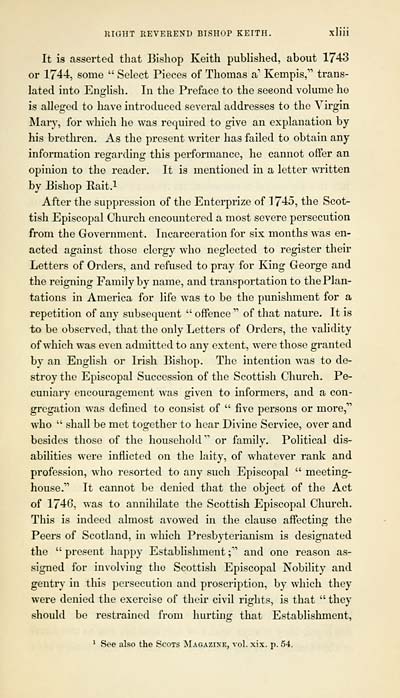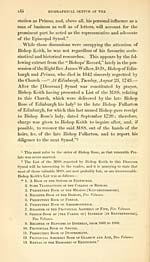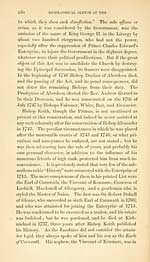Spottiswoode Society > History of the affairs of the Church and State of Scotland from the beginning of the reformation to the year 1568 > Volume 1
(51) Page xliii
Download files
Complete book:
Individual page:
Thumbnail gallery: Grid view | List view

RIGHT REVEREND BISHOP KEITH. xliii
It is asserted that Bishop Keith published, about 1743
or 1744, some " Select Pieces of Thomas a 1 Kempis," trans-
lated into English. In the Preface to the seeond volume he
is alleged to have introduced several addresses to the Virgin
Mary, for which he was required to give an explanation by
his brethren. As the present writer has failed to obtain any
information regarding this performance, he cannot offer an
opinion to the reader. It is mentioned in a letter written
by Bishop Rait. 1
After the suppression of the Enterprize of 1 745, the Scot-
tish Episcopal Church encountered a most severe persecution
from the Government. Incarceration for six months was en-
acted against those clergy who neglected to register their
Letters of Orders, and refused to pray for King George and
the reigning Family by name, and transportation to the Plan-
tations in America for life was to be the punishment for a
repetition of any subsequent " offence " of that nature. It is
to be observed, that the only Letters of Orders, the validity
of which was even admitted to any extent, were those granted
by an English or Irish Bishop. The intention was to de-
stroy the Episcopal Succession of the Scottish Church. Pe-
cuniary encouragement was given to informers, and a con-
gregation was defined to consist of " five persons or more,""
who " shall be met together to hear Divine Service, over and
besides those of the household " or family. Political dis-
abilities were inflicted on the laity, of whatever rank and
profession, who resorted to any such Episcopal " meeting-
house." It cannot be denied that the object of the Act
of 1746, was to annihilate the Scottish Episcopal Church.
This is indeed almost avowed in the clause affecting the
Peers of Scotland, in winch Presbyterianism is designated
the " present happy Establishment ;" and one reason as-
signed for involving the Scottish Episcopal Nobility and
gentry in this persecution and proscription, by which they
were denied the exercise of their civil rights, is that " they
should be restrained from hurting that Establishment,
1 See also the Scots Magazine, vol. xix. p. 54.
It is asserted that Bishop Keith published, about 1743
or 1744, some " Select Pieces of Thomas a 1 Kempis," trans-
lated into English. In the Preface to the seeond volume he
is alleged to have introduced several addresses to the Virgin
Mary, for which he was required to give an explanation by
his brethren. As the present writer has failed to obtain any
information regarding this performance, he cannot offer an
opinion to the reader. It is mentioned in a letter written
by Bishop Rait. 1
After the suppression of the Enterprize of 1 745, the Scot-
tish Episcopal Church encountered a most severe persecution
from the Government. Incarceration for six months was en-
acted against those clergy who neglected to register their
Letters of Orders, and refused to pray for King George and
the reigning Family by name, and transportation to the Plan-
tations in America for life was to be the punishment for a
repetition of any subsequent " offence " of that nature. It is
to be observed, that the only Letters of Orders, the validity
of which was even admitted to any extent, were those granted
by an English or Irish Bishop. The intention was to de-
stroy the Episcopal Succession of the Scottish Church. Pe-
cuniary encouragement was given to informers, and a con-
gregation was defined to consist of " five persons or more,""
who " shall be met together to hear Divine Service, over and
besides those of the household " or family. Political dis-
abilities were inflicted on the laity, of whatever rank and
profession, who resorted to any such Episcopal " meeting-
house." It cannot be denied that the object of the Act
of 1746, was to annihilate the Scottish Episcopal Church.
This is indeed almost avowed in the clause affecting the
Peers of Scotland, in winch Presbyterianism is designated
the " present happy Establishment ;" and one reason as-
signed for involving the Scottish Episcopal Nobility and
gentry in this persecution and proscription, by which they
were denied the exercise of their civil rights, is that " they
should be restrained from hurting that Establishment,
1 See also the Scots Magazine, vol. xix. p. 54.
Set display mode to: Large image | Transcription
Images and transcriptions on this page, including medium image downloads, may be used under the Creative Commons Attribution 4.0 International Licence unless otherwise stated. ![]()
| Permanent URL | https://digital.nls.uk/79597400 |
|---|
| Description | Volume I. |
|---|---|
| Attribution and copyright: |
|

